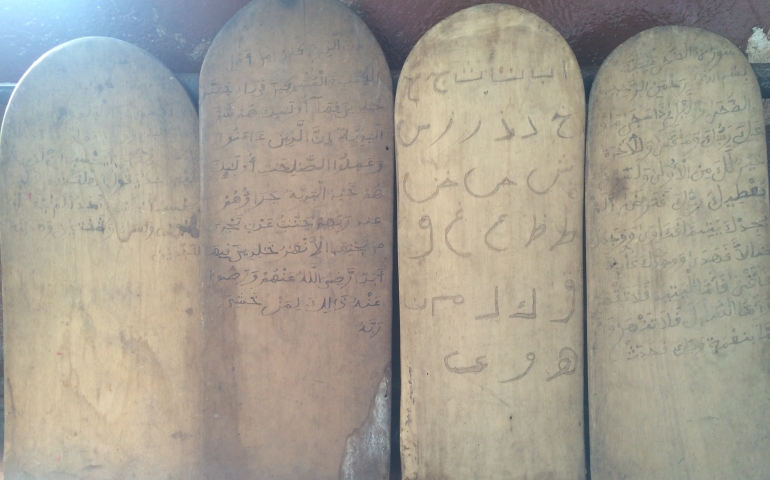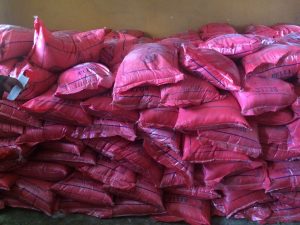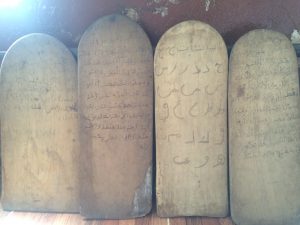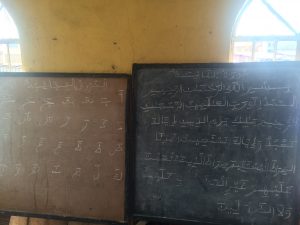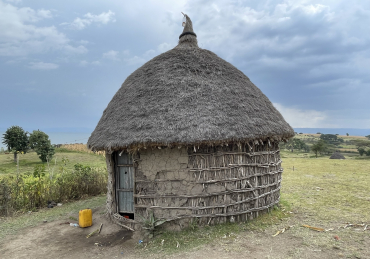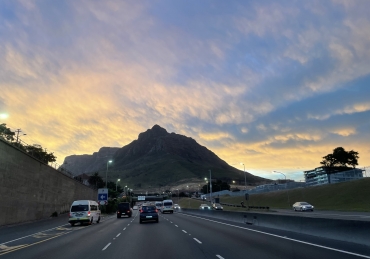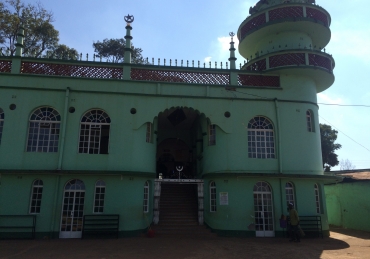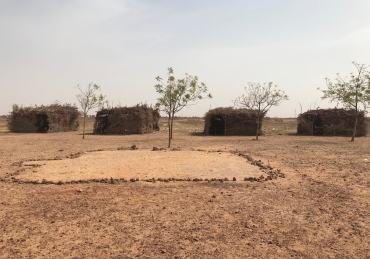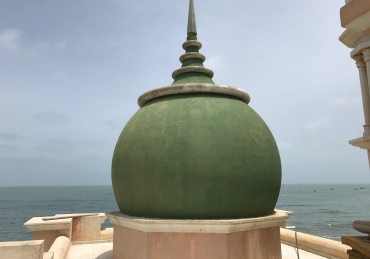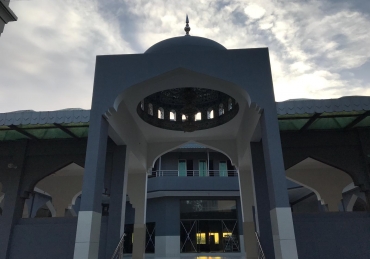UWT Delegation on the ground in Sierra Leone
بسم الله الرحمن الرحيم
The following is a daily account from a delegation of Ummah Welfare Trust currently in Sierra Leone delivering and overlooking the charity’s £100,000 Iftar programme as well as other projects. The account and further details are available on this link.
Day 1 – Thursday 1 June 2017
Returning to Sierra Leone
Sierra Leone is a country in West Africa that is bordered by Guinea in the north, Liberia in the south-east, and the Atlantic Ocean in the south-west. It is home to some of the poorest people of the world. The country’s Muslim population is more than 70% with over four million Muslims. Despite this, very few Muslim charities operate in this part of the world. I became aware of the plight of this nation a year ago when I was invited here to participate in a nationwide education and faith tour. Subsequently in December 2016, I returned with UWT Trustee Shaykh Muhammad Ahmad to undertake an assessment and devise a strategy to address the needs of the people. The accounts of both trips are available online (Click here for the first trip and click here for the second trip). Following the second visit, the charity identified several strategic objectives and initiated various programmes to tackle the economic, religious, social and humanitarian challenges. In this blessed month of Ramadan, the charity is providing Iftar packs to more than two thousand families in different parts of the country and thereby touching the lives of some fifteen thousand poor and impoverished people. The aim of our visit is to deliver and supervise this project and expand the charity’s work here.
Following our arrival into Freetown yesterday evening and meeting our hosts, we start our programme in the morning and head towards the Shell, Kissy area in the outskirts of Freetown. Four hundred poor people have been invited here to benefit from the Iftar distribution programme. The beneficiaries include the disabled, the elderly, the widows, the orphans and other disadvantaged members of society. All the beneficiaries have been carefully selected through a rigorous assessment process and issued a colour coded voucher based on the different category of beneficiaries. After a short programme on the importance of fasting and steadfastness on faith, we start distributing the Iftar packs. Each Iftar pack contains 50kg rice along with milk, oil, sugar, salt and sardines. Each pack costs £50 and will support the family throughout the month of Ramadan. It is extremely humbling to observe some of the most deprived stand in queues and wait under the scorching heat for an Iftar pack. The smile on their faces and their words of thanks reflect their genuine appreciation and gratitude for the support provided by the charity and its donors.
Later in the afternoon, we head towards the Magazine area in Central Freetown where we distribute Iftar packs to one hundred families. This area is extremely poor despite its close proximity to the Atlantic Ocean. We visit the slums and also visit the Al-Hayy Al-Qayyum Mosque. The mosque is small and cannot cater for the needs of the community. Its capacity is two hundred and fifty people but the congregation exceeds six hundred people. For this reason, the roof is used and there is a regular spill over on the street which is extremely narrow; our car just barely managed to get through. The local community request we support them because the roof of the mosque is in need of urgent repairs. Such are the poverty levels that local communities struggle to afford several hundred pounds to repair mosques. At this mosque, we observe the traditional methods of teaching Arabic and the Qur’an through wooden boards. Alphabet books and pens are simply too expensive for the people living in urban areas. Accordingly, one can imagine the condition in the rural areas.
We pray that Allah Almighty showers his mercy on this nation and rewards all those who are supporting them.
Yusuf Shabbir
Freetown, Sierra Leone
Day 2 – Friday 2 June 2017
Supporting deprived families in Moyamba
It is an early start as we head to Moyamba to continue the Iftar distribution programme. Moyamba is the capital and largest city of Moyamba District, in the Southern Province of Sierra Leone, with a population of more than eleven thousand people. The population of the city is ethnically diverse, although the Mende people make up the majority. The district is known for its fertile ground and agriculture, particularly for its ginger. The distance between Freetown and Moyamba is 120km. However, the journey through the scenic landscape takes nearly four hours. The transport infrastructure is weak and many roads require repairs.
We arrive into Moyamba after midday and our first stop is the Moyamba Central Mosque where five hundred males and females have gathered for Jumuah Salah. The mosque was founded in the 1940s by a pious saint Al-Haji Lanaphia Tarawally who passed away in 1954 and is buried close to the mosque. He was a great visionary and mystic and had amazing foresight. We are requested to lead Jumuah Salah at this mosque and also deliver the sermon which is well received.
Immediately after Jumuah Salah, we head towards Makeni Road where one thousand people have gathered to receive the Iftar packs. There are thousands of poor people in this region. However, the charity has selected some of the most impoverished and disadvantaged families to ensure that support is provided to the most needy. They include those who are physically and psychologically impaired along with those who are extremely elderly. As the distribution nears completion, heavy rainfall and lightning begins. This is the rain season in Sierra Leone. Our distribution is impacted as the rain continues for an hour. Eventually, the distribution successfully comes to an end.

Later in the evening we realise the impact of our programme and the consequences of inaction. We meet a businessman Abdurrazzaq and assume he is Muslim from his name. Later he explains to us that his late father was a Muslim but he and some other members of his family converted because of the support provided by Christian missionaries. This is the first time he has come across a Muslim charity.
Yusuf Shabbir
Moyamba, Sierra Leone
Day 3 – Saturday 3 June 2017
Families travel seven miles to receive aid
After writing yesterday’s account, we met again with Abdurrazzaq who discussed his story. He explained that his father passed away fifty years ago and he was a devout Muslim. His mother is alive who, along with his wife, is Muslim. In fact, his step father is the Chair of the local mosque. Two years ago, Abdurrazzaq converted to Christianity because he was struggling financially and the local church supported him. We have a fruitful discussion focusing on his name and its meaning and how he may continue the legacy of his late father. He suggests himself that our encounter is a blessing of Allah and that he shall visit us in the morning with his mother and wife and revert to Islam. True to his promise, he visits us in the morning with his family and reverts to Islam. His family is extremely happy as he is the breadwinner of the wider family and thereby the faith of the whole family has been safeguarded. May Allah preserve their faith and keep them steadfast. A discussion with local scholars and community leaders reveals that this is the first time a Muslim charity has delivered such a project in this region. The project has already strengthened the confidence of Muslims in the region and made them realise that they are part of a global brotherhood which is committed to support them. Although Abdurrazzaq is not a beneficiary of our Iftar programme, he himself confirms that the programme has changed his view of Muslims. For us, this encounter alone is sufficient for the success of this programme and our trip. All praise belongs to Allah who guides whomsoever he wishes.
Another blessing this morning is the opportunity to scan through the manuscripts, books and writings of the Saint Al-Haji Lamphia Tarawally (d. 1954). Unfortunately, the books have not been properly preserved. However, his descendants have agreed to take steps to preserve this valuable collection.
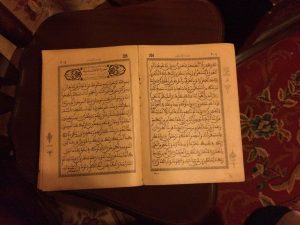 It is now time to leave Moyamba and head to Blama. Blama is a town in the Kenema District in the Eastern Province of Sierra Leone. The journey takes three hours. We arrive in the afternoon and distribute Iftar packs to some four hundred families who have gathered from different areas of the district. Some have travelled from as far as seven miles to receive an Iftar pack. This demonstrates the extent of the poverty. As the distribution ends, there are many other disappointed people queuing up requesting support.
It is now time to leave Moyamba and head to Blama. Blama is a town in the Kenema District in the Eastern Province of Sierra Leone. The journey takes three hours. We arrive in the afternoon and distribute Iftar packs to some four hundred families who have gathered from different areas of the district. Some have travelled from as far as seven miles to receive an Iftar pack. This demonstrates the extent of the poverty. As the distribution ends, there are many other disappointed people queuing up requesting support.
We leave Blama and head to Freetown. The journey takes five hours and we arrive late in the evening. En route, we complete our fast with juice and biscuits. Within minutes of arriving into Freetown, there is an electricity blackout. This is common occurrence in the capital.
Yusuf Shabbir
Freetown, Sierra Leone
Day 4 – Sunday 4 June 2017
“Thirty three family members died from Ebola and I do not have a house”
Over the past three days, we have distributed aid in the Western, Southern and Eastern regions of the country. Today, we are heading to Port Loko which is 96km from Freetown, a three hour drive. Port Loko is the capital and second largest town of Port Loko District in the Northern Province of Sierra Leone. The town has a population of approximately twenty five thousand people.
We arrive in the afternoon and distribute Iftar packs to four hundred families. This is the first time the local community has benefited from a programme of this scale. Some of the recipients arrived here yesterday and spent the night on the streets in anticipation of the aid. One of the beneficiaries is Al-Haji Shaykha Kamara who is extremely grateful. He explains that thirty three members of his family died during the Ebola crisis and he does not have a house to live in. He resides in the local Jamil Jalil mosque, a beautiful mosque built in the 1950s. Here we also perform Wudu from a large mud vessel.
Freetown, Sierra Leone
Day 5 – Monday 5 June 2016
Change of Plan
Today was supposed to be the final day of our Iftar distribution in Kamakwie. However the vehicle transporting the goods from Freetown to this remote location near the border of Guinea has broken down. We therefore decide to spend the day in Freetown meeting with various organisations and agreeing a broad framework for future programmes. Several meetings take place throughout the day. Potential projects discussed include: Cemetery project, Hijab project, group weddings, leadership and empowerment and other short and long term projects.
We also learn during the day that there is a substantial presence of satanic cults and societies in the country. Some of these societies kill humans, cut them into pieces and eat them or burn them as part of their ritual practices. Unfortunately, some Muslims are also involved in this. Some of the practices are beyond human comprehension. Sometimes organs are removed from humans who are alive. We hear of an incident in which the genital parts of a young female teenager were forcibly removed whilst she was alive and conscious. Such cultic and satanic practices need to be eliminated to attract the divine mercy and bring prosperity to the nation.
Day 6 – Tuesday 6 June 2017
Towards the border of Guinea
It is an early start as we head towards Kamakwie. Kamakwie is a small town in the Bombali District in the Northern Province of Sierra Leone close to the border of Guinea. The population of the town exceeds eight thousand. The population of Kamakwie is predominantly from the Limba, Temne, and Loko ethnic groups. The distance between Freetown and Kamakwie is 270km. However the journey takes us more than five hours as the roads are in a very poor condition. The latter part of the journey after Makeni is particularly challenging as there are no Tarmac roads. We now understood why the delivery truck broke down yesterday.
We arrive after 2pm and are greeted by some four hundred families who have been selected to benefit from the aid programme. We can sense the joy and happiness among the whole community. Local community leaders inform us that this is the first time such an aid programme has taken place in this remote area. The beneficiaries include the disabled and some of the poorest from two chiefdoms. The region is densely populated with Muslims and we clearly sense that people are more religious here. Young children are eager to recite the Qur’an to us. After completing the distribution, we perform Salah in the local Masjid and return to Freetown via the same five hour journey.
By the grace of Almighty Allah, we have directly supported 2100 families through the Iftar programme and personally supervised the entire programme. We pray to Almighty Allah to reward all those who supported the initiative financially or otherwise.
Yusuf Shabbir
Freetown, Sierra Leone
Day 7 – Wednesday 7 June 2017
Empowering street beggars
Today is the final day of our trip. Our flight is at 6pm which means we have to leave for the Airport at 1pm. Thus, it is an early morning start as we head to the Ansar al-Islam institute which comprises of a school as well as an institute for Islamic sciences. We meet with the teachers and students and discuss the vision of the institute and its curriculum. The setup is impressive and we discuss ways in which the institute can develop further to develop the future scholars and leaders for the nation. Our feedback is well received by the management.
Our next stop is the used clothes market. There is a huge market here for used clothes and used products generally and the charity is looking at tapping into this market and supporting local businesses. My colleague who has accompanied me from the UK heads the charity’s recycling and clothes department and has had several discussions with business leaders here. Supporting local businesses is vital to economic growth and a multi-sector partnership is necessary to tackle poverty and economic deprivation.
At 11am, we arrive into Central Freetown to deliver a unique project targeted at a category of poor people who are generally neglected. The ‘Street Beggars’ pilot project saw one hundred extremely poor and disabled beggars come together to receive a business start up grant of £50 each. It is envisaged that this amount will empower them to earn a basic income and relieve them from begging. Whilst delivering this project, many hundreds of people gather on the streets and express their happiness and gratitude. This programme has huge potential to tackle poverty so long as effective monitoring systems are in place.
It is now time to bid farewell to Sierra Leone. We head to the sea port to cross over the Atlantic Ocean to Lungi International Airport. However, the boat has left leaving us with no choice but to hire a private speedboat to take us across. We arrive at Lungi at around 3pm and attend the local mosque outside the Airport for Salah. Here, we are requested to share some advice and the local community request us for some support. It is clear that many people are aware of our visit and the Ramadan Aid programme as many Airport staff recognise us and extend their gratitude. Overall, the trip has been a huge success. We pray to Almighty Allah to accept our humble efforts and make it a means of guidance and the charity expanding the work in this region.
Yusuf Shabbir
Lungi International Airport, Sierra Leone
Note: As I edit this account on my return to the UK, I have just received the following message from Sierra Leone: “A woman came to me today expressing appreciation and willingness to bring forward five hundred men and women who wish to turn to Islam. She followed the Iftar project and expressed her community willingness to convert to Islam.” (11 June 2017)

